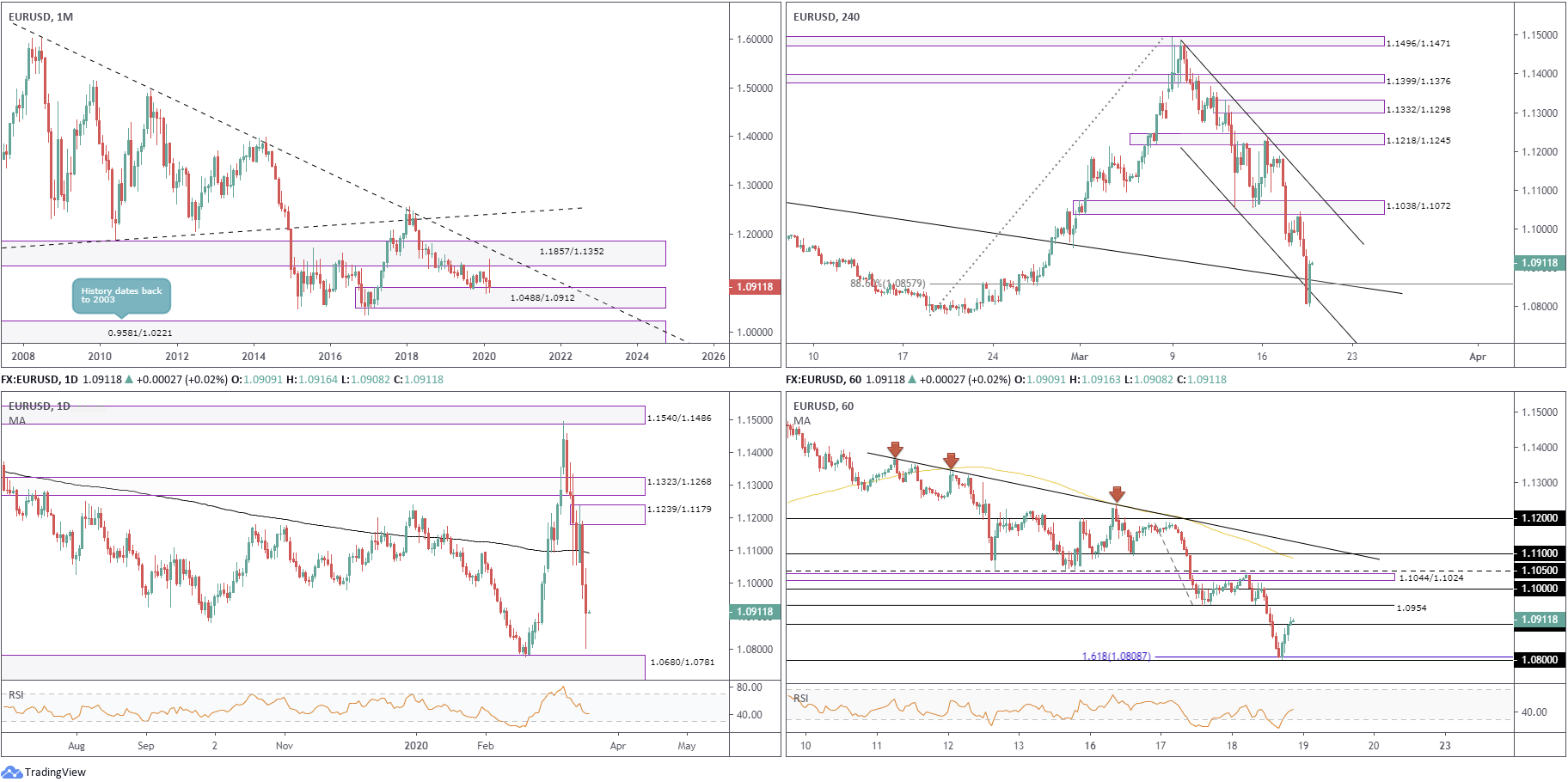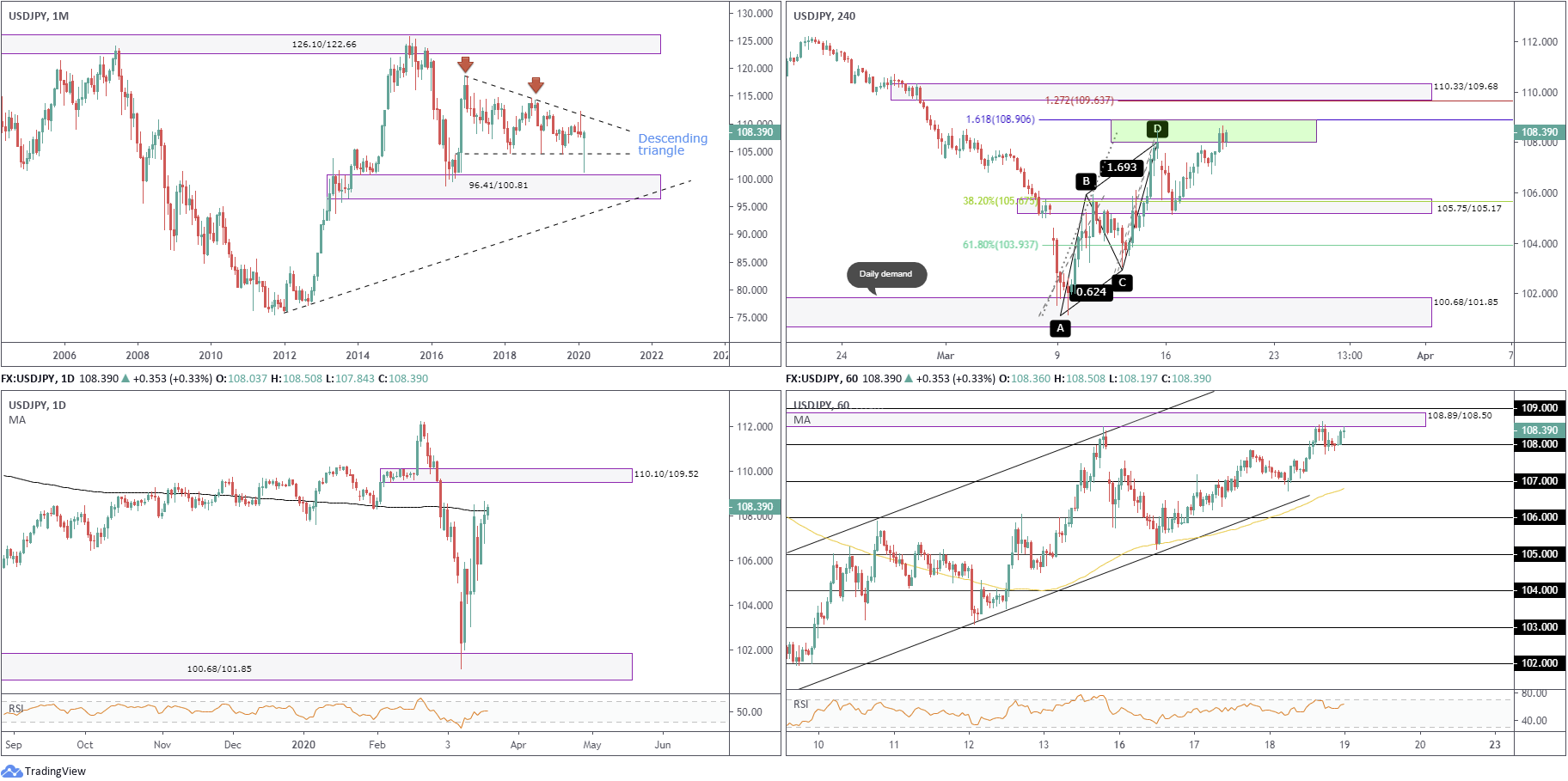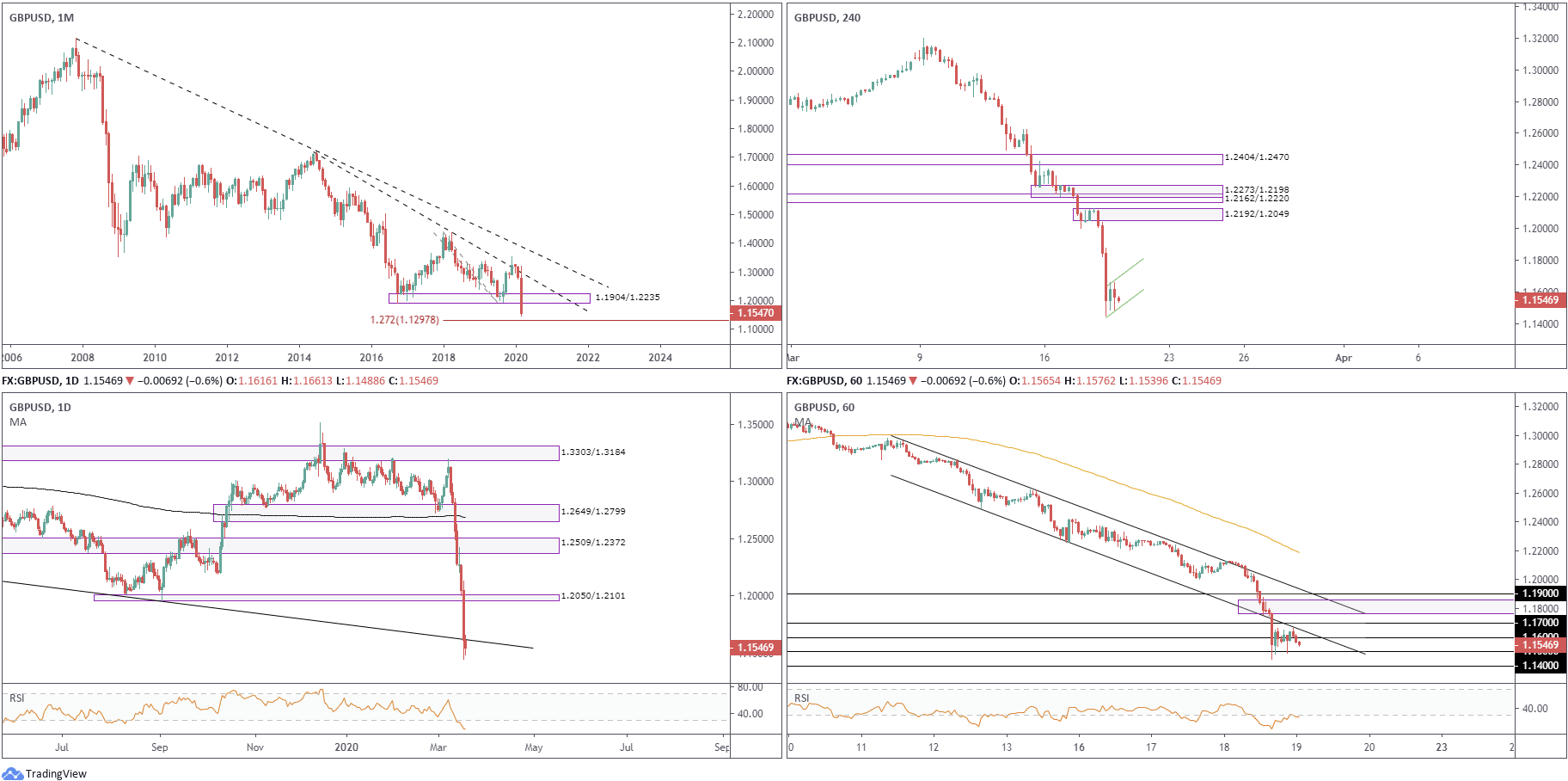EUR/USD:
Monthly timeframe:
(Technical change on this timeframe is often limited though serves as guidance to potential longer-term moves)
The month of February witnessed EUR/USD revisit the upper limit of demand at 1.0488/1.0912 – a noteworthy area given the momentum derived from its base – and pencil in an appealing (bullish) hammer candlestick pattern.
In the early stages of March, as you can see, the market manoeuvred the pair into demand-turned supply at 1.1857/1.1352. However, leaving long-term trendline resistance (1.6038) unchallenged, price has reversed gains and revisited demand mentioned above at 1.0488/1.0912.
The primary downtrend remains in motion, trading lower since 2008, exhibiting clear lower peaks and troughs.
Daily timeframe:
Outlook partially altered from previous analysis –
Following a precipitous decline from supply at 1.1540/1.1486, an area located within the confines of the said monthly demand-turned supply at 1.1857/1.1352, the 200-day SMA gave way in recent trading. This rolled price action to near-four-week lows at 1.0801, stationed a few points ahead of demand coming in at 1.0680/1.0781, which happens to reside within the current monthly demand zone.
What’s also notable from a technical perspective is the RSI indicator recently dethroned the 50.00 value, suggesting we’re heading for oversold territory.
H4 timeframe:
Technical developments on the H4 timeframe witnessed a retest at the underside of demand-turned supply from 1.1038/1.1072. Renewed downside kicked in early Europe, registering fresh weekly lows and testing an interesting combination of support. Comprised of a deep 88.6% Fib retracement at 1.0857, a trendline resistance-turned support (1.1172) and channel support (1.1055), H4 action reversed in solid form, closing at highs.
H1 timeframe:
Intraday flow observed the shared currency succumb to dollar upside Wednesday, largely disregarding ECB headlines.
From a technical standpoint, price staged a healthy recovery off a 161.8% Fib ext. level north of 1.08 at 1.0808 and since reclaimed 1.09+ status. This potentially paves the way for further gains today towards clear-cut resistance at 1.0954, with a break exposing the widely watched 1.10 figure and demand-turned supply at 1.1044/1.1024: the origin of the most recent downswing.
Structures of Interest:
Monthly price seen grasping the top edge of familiar demand at 1.0488/1.0912, daily price turning higher just north of demand at 1.0680/1.0781, H4 price rebounding from a combination of support around 1.0857 and H1 crossing 1.09 to the upside will likely be perceived as a bullish market today.
A retest at 1.09 is likely a watched setup, with 1.0954 (H1 resistance) pencilled in as the initial target, followed by 1.10.
AUD/USD:
Monthly timeframe:
(Technical change on this timeframe is often limited though serves as guidance to potential longer-term moves)
Demand at 0.6358/0.6839 yielded last week, after capping downside since 2016. Overwhelmed by the effects of coronavirus, the pair recently struck seventeen-year lows and dethroned another major demand area at 0.6094/0.5866, a zone formed in 2003 that held price higher in late 2008.
Recent movement has exposed another layer of demand at 0.5219/0.5426.
Since 2011, the primary trend in this market has faced a southerly bearing.
Daily timeframe:
Shedding more than 3.5% Wednesday, AUD/USD powered its way through demand coming in at 0.5926/0.6062 (located within recently engulfed monthly demand at 0.6094/0.5866) and drove deep into the walls of supply-turned demand at 0.5664/0.5798.
In terms of the RSI indicator, given the predominant downtrend in this market, the value continues to run through oversold terrain, recently nosediving to 13.00.
H4 timeframe:
As we fade lows not seen since 2003, newly formed supplies continue to form. The latest area to grace the charts falls in around 0.6036/0.5978. Above here, technical research shows another layer of supply rests nearby at 0.6147/0.6078.
H1 timeframe:
Wednesday’s closing movement eroded a portion of losses a few points ahead of 0.57, confirmed by the RSI recovering from lows at 16.00. We’re now head-to-head with the underside of 0.58, shadowed by two interesting channel resistances (prior support [0.6212/0.5958]). While a break north of the said levels has a reasonably appealing supply in sight at 0.5967/0.5922, a pullback from 0.58ish is possible, given the local confluence.
Structures of Interest:
The break of monthly demand at 0.6094/0.5866 commands attention, suggesting additional loss could be on the cards. 0.58, based on the H1 chart, along with neighbouring channel resistances, therefore, could hold and guide prices lower today. The caveat, however, is daily price recently joining demand at 0.5664/0.5798.
A push south from 0.58, nonetheless, has 0.57 in the firing range, followed by a potential breach of daily demand around 0.5664.
USD/JPY:
Monthly timeframe:
(Technical change on this timeframe is often limited though serves as guidance to potential longer-term moves)
Since kicking off 2017, USD/JPY has been busy carving out a descending triangle pattern (118.66/104.62). February had price elbow a touch outside the upper boundary of the aforementioned descending triangle to 112.22, though retreated lower and produced a shooting star pattern into the month’s end.
March, so far, breached the lower edge of the descending triangle, yet has recovered in strong fashion, leaving nearby demand at 96.41/100.81 unchallenged. Note current action trades in the shape of a hammer candlestick signal, considered a bullish pattern at troughs.
Daily timeframe:
Partially altered from previous analysis –
Recent upside saw action readdress the 200-day SMA, currently circulating around 108.23. While the dynamic S/R capped upside Monday and held price Wednesday, the resurgence of bidding could nudge price towards demand-turned supply at 110.10/109.52. This is a significant area knowing it is the origin of the move to highs at 112.22 and the decision point to cross above the 110.29 January 17th high.
Selling from current price, on the other hand, display’s limited support until reaching demand coming in at 100.68/101.85, an area extended from September 2016 and glued to the top edge of the current monthly demand zone.
H4 timeframe:
Partially altered from previous analysis –
Although a reaction out of the 108.90/108.08 AB=CD bearish pattern occurred at the beginning of the week, price is seen re-engaging the zone a second time. A violation to the upside has supply posted at 110.33/109.68 (joined with a 127.2% Fib ext. level at 109.63), an area that’s glued to the top edge of the current daily supply-turned demand zone at 110.10/109.52.
Traditional take-profit targets associated with AB=CD formations generally reside around the 38.2% and 61.8% Fib retracement levels of legs A-D – in this case, at 105.67 and 103.93. As you can see, 105.67 along with a supply-turned demand zone at 105.75/105.17 entered the fold at the beginning of the week. The second take-profit target out of the AB=CD formation remains intact at 103.93, therefore a response from 108.90/108.08 is still not out of the question.
H1 timeframe:
Despite global equities sinking across the board Wednesday, the safe-haven Japanese yen failed to derive much demand, lifting USD/JPY to highs of 108.65, testing supply coming in at 108.89/108.50. Selling from here appears limited by the 108 handle, withstanding a number of downside attempts amid late US trade.
It should also be noted the current H1 supply forms part of the upper H4 resistance zone, and a break of the H1 zone exposes 109.
The RSI, for those who follow momentum-based indicators, recently faded overbought territory and currently trades north of the 50.00 value.
Structures of Interest:
Failure to break below 108 suggests weakness among sellers from H1 supply at 108.89/108.50, the H4 AB=CD reversal zone and the 200-day SMA. A decisive H1 push through 108, however, will likely prompt a sell-off towards 107, along with the 100-period SMA (H1).
Further recovery here, though, will likely take a run at H4 supply from 110.33/109.68, an area boasting connections with daily supply-turned demand at 110.10/109.52. Therefore, breakout buying north of 109 is likely to be seen.
GBP/USD:
Monthly timeframe:
(Technical change on this timeframe is often limited though serves as guidance to potential longer-term moves)
Down nearly 10% in the month of March, south of trendline resistance (1.7191), traders recently witnessed a familiar area of support at 1.1904/1.2235 give way.
With price trading at multi-year lows, the next visible support target on the monthly timeframe falls in around 1.1297, a 127.2% Fib ext. level.
Daily timeframe:
1.2050/1.2101 (now a serving resistance zone), a small support zone, put up little fight yesterday, with GBP/USD recording losses in excess of 3.5% and hauling the RSI indicator deep within oversold waters at 17.00.
With reference to support on this timeframe, trendline support (1.2373) is holding by a thread. A decisive push lower from here places the weekly 127.2% Fib ext. firmly on the radar at 1.1297.
H4 timeframe:
Wednesday’s precipitous decline formed another layer of supply at 1.2192/1.2049, positioned south of a demand-turned supply at 1.2162/1.2220.
Fading multi-year lows, we are seeing a mild consolidation phase between 1.1449/1.1661, with potential to form a bearish flag pattern (green). This is generally considered a continuation formation.
H1 timeframe:
Sterling fell through channel support (1.2490) in early US trade Wednesday – a fall aided by increased demand for the US dollar.
The 1.15 handle holds for now, with 1.16 offering sloppy resistance. The channel support-turned resistance may enter play today in the event price is bid north of 1.16.
The RSI is seen recovering from deep within oversold territory, currently toying with 30.00.
Structures of Interest:
Most will shudder at the thought of buying this market. Technicals support this. Monthly suggests we’re heading to 1.13ish, daily price struggles to hold trendline support, H4 action is in the process of forming a bearish flag and H1 is seen establishing ground beneath 1.16.
Therefore, a H4 close out of the bearish flag pattern may be of interest to some traders today, with an ultimate downside target (assuming a bearish close forms) set at 1.08!
DISCLAIMER:
The information contained in this material is intended for general advice only. It does not take into account your investment objectives, financial situation or particular needs. FP Markets has made every effort to ensure the accuracy of the information as at the date of publication. FP Markets does not give any warranty or representation as to the material. Examples included in this material are for illustrative purposes only. To the extent permitted by law, FP Markets and its employees shall not be liable for any loss or damage arising in any way (including by way of negligence) from or in connection with any information provided in or omitted from this material. Features of the FP Markets products including applicable fees and charges are outlined in the Product Disclosure Statements available from FP Markets website, www.fpmarkets.com and should be considered before deciding to deal in those products. Derivatives can be risky; losses can exceed your initial payment. FP Markets recommends that you seek independent advice. First Prudential Markets Pty Ltd trading as FP Markets ABN 16 112 600 281, Australian Financial Services License Number 286354.












 Access +10,000 financial
instruments
Access +10,000 financial
instruments

